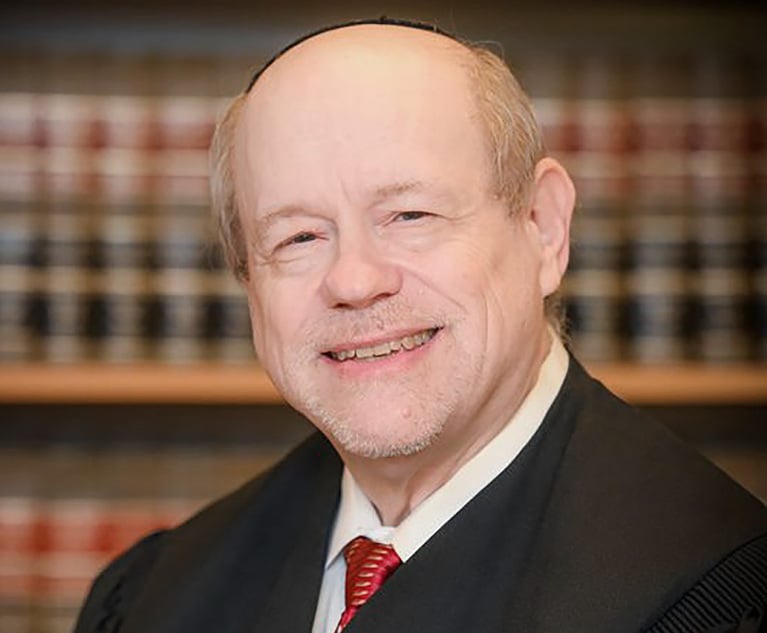Qualified Immunity Shields Officer From Deadly Force Claim in 'Kisela'
In his Section 1983 Litigation column, Martin A. Schwartz notes that qualified immunity has recently come under attack by prominent federal jurists and legal scholars.
July 02, 2018 at 11:45 AM
4 minute read
 Thompson v. Clark, Kisela v. Hughes . White v. Pauly Mullenix v. Luna Brosseau v. Haugen Taylor v. Barkes Caroll v. Carman Stanton v. Sims Kisela v. Hughes Kisela v. Hughes Pearson v. Callahan Graham v. Connor Tennessee v. Garner Kisela Kisela Kisela Graham/Garner Kisela Kisela
Thompson v. Clark, Kisela v. Hughes . White v. Pauly Mullenix v. Luna Brosseau v. Haugen Taylor v. Barkes Caroll v. Carman Stanton v. Sims Kisela v. Hughes Kisela v. Hughes Pearson v. Callahan Graham v. Connor Tennessee v. Garner Kisela Kisela Kisela Graham/Garner Kisela Kisela - The qualified immunity issue is whether the officer's conduct violated '“clearly established statutory or constitutional rights of which a reasonable person would have known.' 'Because the focus is on whether the officer had fair notice that her conduct was unlawful, reasonableness is judged against the backdrop of the law at the time of the conduct.”' Nothing extreme here. So far so good!
- The court in Kisela reiterated language from several recent qualified immunity decisions that the pertinent issue is whether the contours of the right were sufficiently definite that “'any reasonable official'” in defendant's position would have known that he was violating it. Kisela, 138 S. Ct. at 1153. It is unclear whether there is a meaningful distinction, or for that matter any distinction, between a “reasonable official” and “any reasonable official.” What is clear is that this language shift by the court is meant to send a message to lower courts and litigators that qualified immunity is not easily overcome.
- The court continued its familiar mantra that while law can be clearly established even without '“a case directly on point,”' to be clearly established, the existing precedent must have placed the constitutional question '“beyond debate.”' Quite a fine line between there being no requirement of precedent “on point,” and precedent placing the issue “beyond debate,” but it's a line the Supreme Court invariably administers in favor of finding the officer protected by qualified immunity. In fact, the court in Kisela reiterated language it has articulated over and over again that qualified '“immunity protects all but the plainly incompetent or those who knowingly violate the law.”'
- Most importantly, especially for §1983 Fourth Amendment claims, the court in Kisela again stressed that in determining whether the defendant violated clearly established federal law, courts must evaluate the law at a very high level of specificity, although, if we take the court at its word, law can be clearly established even without precedent “on point.” Mere general statements of constitutional law, such as the Graham principle that “an officer may not use unreasonable force,” or the Garner principle that an officer may not employ deadly force unless “the suspect poses a threat of serious harm, either to the officer or others”, cannot clearly establish the law because they do not give “fair warning” to the officer as to which conduct in particular circumstances is constitutional and which is unconstitutional. The Supreme Court said that it has '“repeatedly told courts—and the Ninth Circuit in particular —not to define clearly established law at a high level of generality.”'
- And that is not all! The court once again stressed that specificity in the clearly established law analysis is “especially important in the Fourth Amendment context” because law enforcement officers sometimes find it difficult to determine how the relevant Fourth Amendment principles apply in factual circumstances the officer confronts. The court said that in excessive force cases “police officers are entitled to qualified immunity unless existing precedent “squarely governs the specific facts at issue,” 138 S. Ct. at 1153, quoting Mullenix v. Luna, 136 S.Ct. at 308.
This content has been archived. It is available through our partners, LexisNexis® and Bloomberg Law.
To view this content, please continue to their sites.
Not a Lexis Subscriber?
Subscribe Now
Not a Bloomberg Law Subscriber?
Subscribe Now
NOT FOR REPRINT
© 2025 ALM Global, LLC, All Rights Reserved. Request academic re-use from www.copyright.com. All other uses, submit a request to [email protected]. For more information visit Asset & Logo Licensing.
You Might Like
View All
Decision of the Day: Qui Tam Relators Do Not Plausibly Claim Firm Avoided Tax Obligations Through Visa Applications, Circuit Finds

'Serious Legal Errors'?: Rival League May Appeal Following Dismissal of Soccer Antitrust Case
6 minute read
Decision of the Day: Judge Sanctions Attorney for 'Frivolously' Claiming All Nine Personal Injury Categories in Motor Vehicle Case

Trending Stories
- 1Rejuvenation of a Sharp Employer Non-Compete Tool: Delaware Supreme Court Reinvigorates the Employee Choice Doctrine
- 2Mastering Litigation in New York’s Commercial Division Part V, Leave It to the Experts: Expert Discovery in the New York Commercial Division
- 3GOP-Led SEC Tightens Control Over Enforcement Investigations, Lawyers Say
- 4Transgender Care Fight Targets More Adults as Georgia, Other States Weigh Laws
- 5Roundup Special Master's Report Recommends Lead Counsel Get $0 in Common Benefit Fees
Who Got The Work
J. Brugh Lower of Gibbons has entered an appearance for industrial equipment supplier Devco Corporation in a pending trademark infringement lawsuit. The suit, accusing the defendant of selling knock-off Graco products, was filed Dec. 18 in New Jersey District Court by Rivkin Radler on behalf of Graco Inc. and Graco Minnesota. The case, assigned to U.S. District Judge Zahid N. Quraishi, is 3:24-cv-11294, Graco Inc. et al v. Devco Corporation.
Who Got The Work
Rebecca Maller-Stein and Kent A. Yalowitz of Arnold & Porter Kaye Scholer have entered their appearances for Hanaco Venture Capital and its executives, Lior Prosor and David Frankel, in a pending securities lawsuit. The action, filed on Dec. 24 in New York Southern District Court by Zell, Aron & Co. on behalf of Goldeneye Advisors, accuses the defendants of negligently and fraudulently managing the plaintiff's $1 million investment. The case, assigned to U.S. District Judge Vernon S. Broderick, is 1:24-cv-09918, Goldeneye Advisors, LLC v. Hanaco Venture Capital, Ltd. et al.
Who Got The Work
Attorneys from A&O Shearman has stepped in as defense counsel for Toronto-Dominion Bank and other defendants in a pending securities class action. The suit, filed Dec. 11 in New York Southern District Court by Bleichmar Fonti & Auld, accuses the defendants of concealing the bank's 'pervasive' deficiencies in regards to its compliance with the Bank Secrecy Act and the quality of its anti-money laundering controls. The case, assigned to U.S. District Judge Arun Subramanian, is 1:24-cv-09445, Gonzalez v. The Toronto-Dominion Bank et al.
Who Got The Work
Crown Castle International, a Pennsylvania company providing shared communications infrastructure, has turned to Luke D. Wolf of Gordon Rees Scully Mansukhani to fend off a pending breach-of-contract lawsuit. The court action, filed Nov. 25 in Michigan Eastern District Court by Hooper Hathaway PC on behalf of The Town Residences LLC, accuses Crown Castle of failing to transfer approximately $30,000 in utility payments from T-Mobile in breach of a roof-top lease and assignment agreement. The case, assigned to U.S. District Judge Susan K. Declercq, is 2:24-cv-13131, The Town Residences LLC v. T-Mobile US, Inc. et al.
Who Got The Work
Wilfred P. Coronato and Daniel M. Schwartz of McCarter & English have stepped in as defense counsel to Electrolux Home Products Inc. in a pending product liability lawsuit. The court action, filed Nov. 26 in New York Eastern District Court by Poulos Lopiccolo PC and Nagel Rice LLP on behalf of David Stern, alleges that the defendant's refrigerators’ drawers and shelving repeatedly break and fall apart within months after purchase. The case, assigned to U.S. District Judge Joan M. Azrack, is 2:24-cv-08204, Stern v. Electrolux Home Products, Inc.
Featured Firms
Law Offices of Gary Martin Hays & Associates, P.C.
(470) 294-1674
Law Offices of Mark E. Salomone
(857) 444-6468
Smith & Hassler
(713) 739-1250






